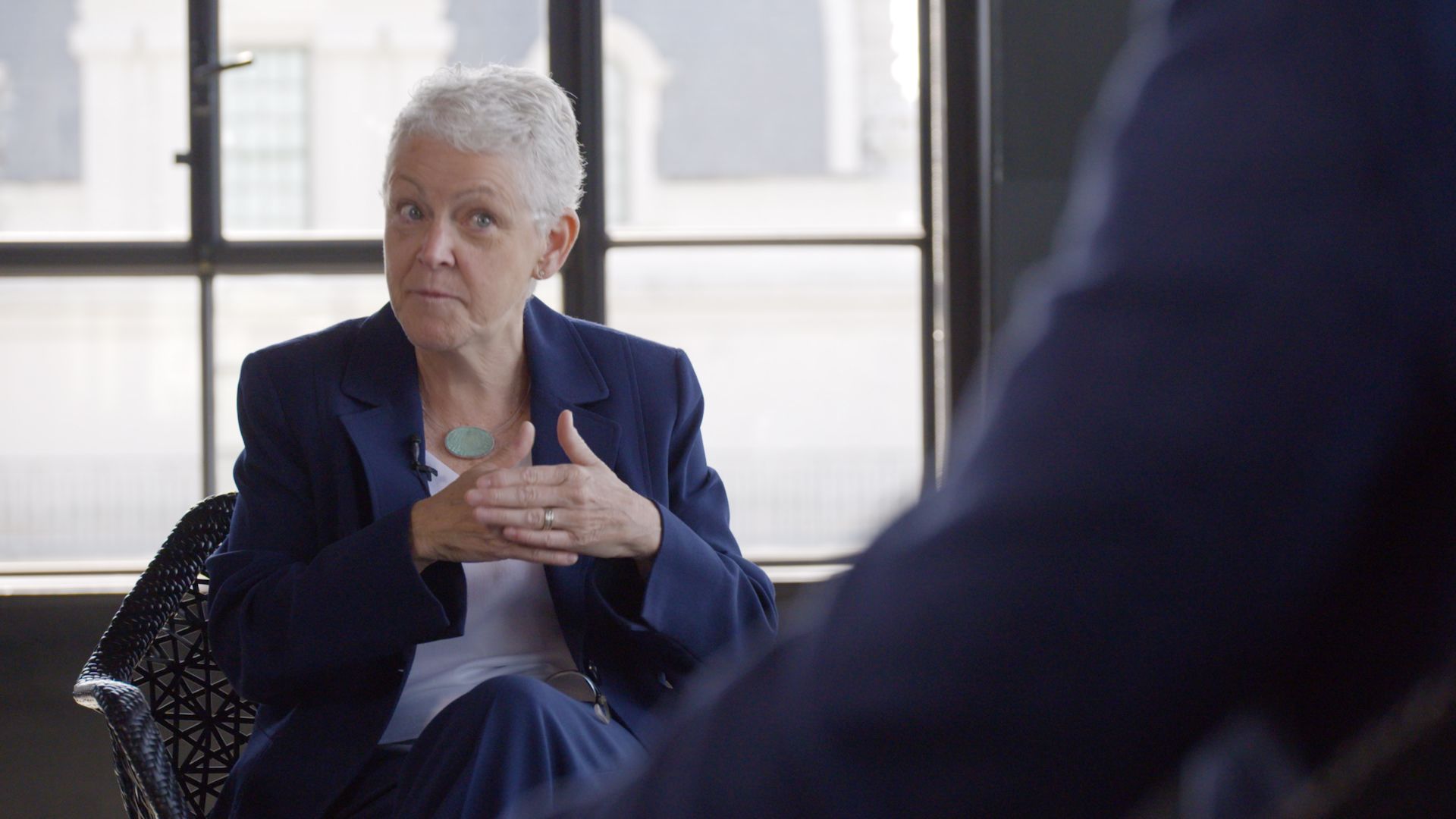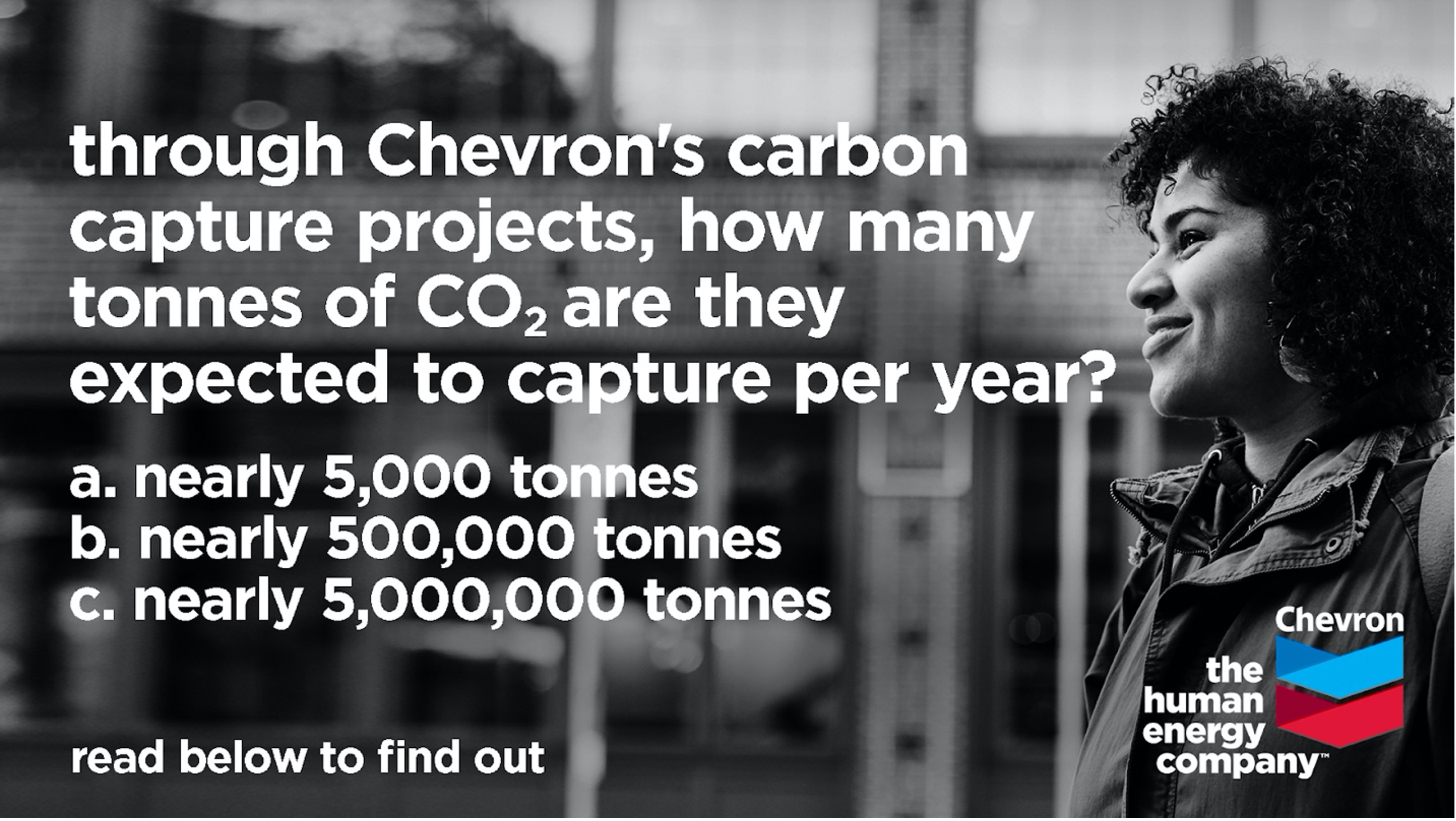| | | | | | | Presented By Chevron | | | | Generate | | By Ben Geman and Andrew Freedman ·May 24, 2021 | | Good morning! Today's Smart Brevity count is 1,284 words, 4.8 minutes. 🛢️Breaking in shale: Cabot Oil & Gas Corp. and Cimarex Energy Co. are merging, the latest in a wave of shale patch consolidation. Bloomberg has more on the $7.4 billion deal. ☀️ Breaking in VC: Aurora Solar raised $250 million in Series C funding to expand development and sales of its software platform. TechCrunch has more. 🎶 Bob Dylan is 80 today, so a terrific blast of late-career ferocity is today's intro tune... | | | | | | 1 big thing: How Gina McCarthy reads the climate landscape |  | | | Gina McCarthy. Screenshot "Axios on HBO" | | | | Gina McCarthy, President Biden's top domestic climate official, hasn't forgotten Big Oil's past funding of climate denial groups, but she now sees an evolving industry. Driving the news: Axios' Mike Allen, interviewing McCarthy for "Axios on HBO," asked if Big Oil is an ally or an enemy in the fight against climate change. - McCarthy replied: "Fossil fuel companies have been, you know, spending a good deal of money early on, on fighting the idea that climate change was real."
- But she added: "I think we even see them recognizing now that the future is different than it used to be and their way of making money is not going to be the same."
Why it matters: The comments come as major oil companies are setting emissions targets, calling for carbon pricing and investing more in clean energy. However, oil and natural gas remain their dominant investments, and the industry is under pressure from environmentalists and activist investors to move faster. Here's a bit more from the interview... Meat: McCarthy doesn't appear worried about inaccurate conservative claims that Biden's coming for your hamburgers. "If you have to make up stuff like that, you must have a very losing argument," she said. Electric cars: "Our car companies know that electric vehicles are the future. And they are working with us to make sure that that future's delivered in the United States," McCarthy said. - She said the administration wants to help boost domestic extraction of key battery minerals when asked about competing with China.
- "The good thing is that we've discovered that we have those minerals available in the United States and we've identified a number of states where we can do some responsible mining," McCarthy said.
Message: McCarthy, asked why she's a climate optimist despite evident perils, said she's "looking at all of the great technology options available today." - "And the whole job is to get people excited about what's available, get that deployed to its maximum," she said.
- A frame of sacrifice, McCarthy said, "is never going to be a winning strategy" and it's "ridiculous" coming out of the pandemic. The way forward, she said, is emphasizing jobs.
|     | | | | | | 2. The showdown over Exxon's climate future is here |  | | | Illustration: Aïda Amer/Axios | | | | Exxon's annual meeting Wednesday will bring the most closely watched shareholder votes on global warming in Big Oil's history. Driving the news: Activist investors Engine No. 1 have nominated four board members who would seek to make Exxon more aggressive on climate. - Engine No. 1's backers include huge public pension funds in California and New York State, and the influential proxy advisory firm Institutional Shareholder Services recommends shareholders support it.
- Engine No. 1 also says Exxon lacks "any serious diversification efforts" that will prepare it to thrive in a low-carbon world. The group says Exxon needs a more disciplined capital investment approach around oil and gas.
Why it matters: It's the highest-profile effort by activist investors to force oil majors to diversify away from their dominant products more quickly. It's also a fight over how Exxon, one of the world's most powerful corporations, should view the future after years of rocky financial performance. The other side: Exxon management opposes the slate. The company says it's in step with the evolving energy mix, citing growing emphasis on carbon capture, hydrogen and biofuels. - Exxon also argues its adjusted capital strategy will deliver strong returns in oil and gas, which it notes will remain huge markets for decades despite low-carbon energy growth.
- CEO Darren Woods tells the Washington Post that Engine No. 1 "have been very focused on what I would say is perceptions of the past."
The intrigue: The rebound in Exxon's share price over the last six months could bolster management. But a new wildcard emerged last week. - An International Energy Agency analysis said a pathway to net-zero emissions in 2050 means no new oil and gas fields would be approved for development (investment in existing fields would continue).
- "It gives a fund manager extra cover to justify voting against management, cover that isn't provided by some call to arms from Greenpeace or the Sierra Club," Bloomberg's Liam Denning writes.
|     | | | | | | 3. Making sense of the G7's big coal move | | G7 environment ministers have pledged to move toward the "absolute end" to financing international development of coal-fired power plants by the end of this year. Why it matters: Their joint communique Friday is a stark statement about how they view the future of the world's most carbon-intensive fuel. The big picture: Here are a few takeaways from the coal pledge... - It's most relevant to Japan, which per the climate think tank E3G and other advocates is the world's second-largest international funder of coal plants.
- "Japan should start by funding clean energy projects in Bangladesh and Indonesia instead of the two coal power projects currently under consideration," said E3G's Chris Littlecott in emailed comments to reporters.
- It could boost pressure on China, which is the top global financier of coal-fired facilities.
- "This would really isolate China as the global lender of last resort for coal, which is not exactly an envious place to be in the run up to the next COP in Glasgow," said Justin Guay of the Sunrise Project, referring to the big United Nations climate summit in November.
- The statement keeps the door open to carbon capture tech. It applies to "unabated" coal plants, that is, plants not equipped with CO2 capture, which has seen very little commercial deployment in the power sector thus far.
What's next: "The strongly worded statement sets the stage for more climate pledges when G7 country leaders, including British Prime Minister Boris Johnson and US President Joe Biden, meet in Cornwall next month," the Financial Times reports. |     | | | | | | A message from Chevron | | Chevron believes in actions, not just words | | |  | | | | We believe the future of energy is lower carbon. That's why we're tying our executives' compensation to lowering the carbon emissions intensity of our operations. In fact, through our carbon capture projects, we're expected to capture nearly 5 million tonnes of CO2 per year. Learn more. | | | | | | Bonus: Coal's future in a net-zero world |  Data: IEA; Chart: Danielle Alberti/Axios The chart above comes from last week's International Energy Agency report that lays out a "narrow but still achievable" path to reaching net-zero global emissions by 2050. |     | | | | | | 4. Nonprofit launches with new CO2 offsets approach | | A new nonprofit group called Climate Vault aims to offer reliable carbon offsets while providing fresh support for CO2 removal technologies and methods. Driving the news: It's the brainchild of the University of Chicago team led by economist Michael Greenstone, who served in the Obama White House. Why it matters: Offsets enable companies and people to help reduce emissions, but ensuring their integrity is notoriously tricky. - Climate Vault aims to solve this problem by tapping into regulated cap-and-trade markets — in essence fusing voluntary efforts with the certainty of formal permit systems.
- The group calls its approach an "antidote to the frequent credibility problems and opacity of voluntary offset programs."
- It then leverages this to support carbon removal methods that can complement fossil fuel emissions cuts to help reach ambitious climate goals.
How it works: Backers fund Climate Vault to buy emissions permits from cap-and-trade markets in North America, which operate in California, Quebec, and among northeast and mid-Atlantic states. - Climate Vault then takes those permits off the market to prevent industrial emitters from using them (that's the "vault" part).
- The group then can provide those permits to providers of carbon removal services, which could then sell them back into the market to finance the efforts.
Where it stands: Supporters include the trading firm DRW, whose CEO is a co-founder, Vanderbilt University, investment firm TPG and others. - Supporters have already enabled reduction of more than 200,000 metric tons of carbon, "surpassing more than five percent of the total CO2 saved by all Tesla vehicles to date in the U.S.," the group said.
- Advisers on the carbon removal side include former Energy Secretary Ernest Moniz.
- Forms of carbon removal range from nature-based efforts like reforestation to nascent direct air capture tech.
Go deeper: Nonprofit Seeks to Trap Carbon in the Financial Markets (WSJ) |     | | | | | | 5. One bug thing: the climate threat to cicadas |  | | | Adult cicadas in Reston, Va., during their last visit in 2004. Photo: Richard Ellis/Getty Images | | | | ICYMI, Andrew wrote about how urbanization and climate change threaten the future of cicadas. On the climate side, warming temperatures could alter the timing of their emergence, or potentially encourage interbreeding between 13-year and 17-year populations. That would reduce the number of cicadas emerging in any given year. Go deeper |     | | | | | | A message from Chevron | | Chevron believes in actions, not just words | | |  | | | | We believe the future of energy is lower carbon. That's why we're tying our executives' compensation to lowering the carbon emissions intensity of our operations. In fact, through our carbon capture projects, we're expected to capture nearly 5 million tonnes of CO2 per year. Learn more. | | | | | | Axios thanks our partners for supporting our newsletters.
Sponsorship has no influence on editorial content. Axios, 3100 Clarendon Blvd, Suite 1300, Arlington VA 22201 | | | You received this email because you signed up for newsletters from Axios.
Change your preferences or unsubscribe here. | | | Was this email forwarded to you?
Sign up now to get Axios in your inbox. | | | | Follow Axios on social media:    | | | | | |







No comments:
Post a Comment